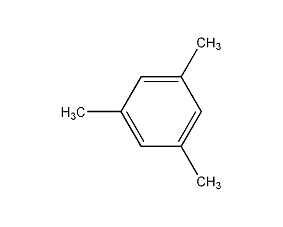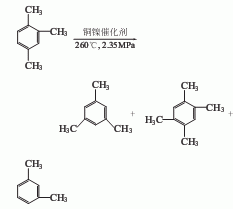
Structural formula
| Business number | 02XP |
|---|---|
| Molecular formula | C9H12 |
| Molecular weight | 120.19 |
| label |
1,3,5-trimethylbenzene, 1,3,5-Trimethylbenzene, thinner, hydrocarbon solvents, For organic synthesis |
Numbering system
CAS number:108-67-8
MDL number:MFCD00008538
EINECS number:203-604-4
RTECS number:OX6825000
BRN number:906806
PubChem number:24867747
Physical property data
1. Properties: colorless liquid with special odor.
2. Boiling point (ºC, 101.3kPa): 162~164
3. Melting point (ºC): -45
4. Relative density (g/ mL, 20/4ºC): 0.8631
5. Relative density (g/mL, 25/4ºC): 0.8611
6. Relative vapor density (g/mL, air=1 ): 4.1
7. Refractive index (n20D): 1.4994
8 . Refractive index (25ºC): 1.49684
9. Viscosity (mPa·s, 20ºC): 1.154
10. Viscosity (mPa·s, 30ºC): 0.936
11. Flash point (ºC): 43
12. Heat of evaporation (KJ/mol, b.p.): 39.06
13. Heat of fusion (KJ/mol): 9.520
14. Heat of formation (KJ/mol, 25ºC, gas): -16.077
15. Heat of formation (KJ/mol, 25ºC, liquid): -63.572
16. Heat of combustion (KJ/mol, gas→liquid): 4979.82
17. Specific heat capacity (KJ/(kg·K), constant pressure): 1.25
18 . Critical temperature (ºC): 364.13
19. Critical pressure (MPa): 3.127
20. Conductivity (S/m, 25ºC): <1×10 -16
21. Vapor pressure (kPa, 48.82ºC): 1.33
22. Vapor pressure (kPa, 99.746ºC): 13.33
23. Vapor pressure (kPa, 141.387ºC): 53.33
24. Thermal conductivity (W/(m·K),-40ºC): 0.1704
25. Thermal conductivity Thermal conductivity (W/(m·K), 20ºC): 0.1586
26. Thermal conductivity (W/(m·K), 80ºC): 0.1402
27. Ignition point ( ºC): 531
28. Lower explosion limit (%, V/V): 1.3
29. Upper explosion limit (%, V/V): 13.1
30. Solubility: Insoluble in water, soluble in ethanol, ether and benzene.
31. Relative density (20℃, 4℃): 0.8651
32. Eccentricity factor: 0.399
33. Solubility parameter (J·cm-3)0.5: 18.007
34. van der Waals area (cm2</supThe boiling points are extremely similar (165.15℃), which is difficult to separate by distillation.
3.Isomerization method using mesitylene as raw material, the single-pass yield rate of1,3,5-trimethylbenzene obtained by fractionation21.6%, the purity is 95% and above, and the by-product is 4% -7% of tetramethylbenzene and 9% of xylene. Average reactor bed temperature260℃, pressure 2.35MPa, emptying 1.0h-1, reforming hydrogen and oil The molar ratio is 10: 1, and the catalyst is aluminum-hydrogen-deficient mordenite: copper: nickel: binding Agent=85.2: 0.5: 15. Under these conditions, the conversion rate of mesitylene is 46%, the selectivity is 47%, and mesitylene is produced in one pass The yield is 21.6%. Japan’s Mitsubishi Gas Company uses HF-BF3 to separate and isomerize xylene, and the by-product contains high concentrations of 1,3,5 –The high boiling substance of trimethylbenzene can be obtained by distillation and refinement.

4. Acetone is dehydrated and synthesized under the catalysis of sulfuric acid to 13%-15% This product can be obtained with a yield of span>. Cool 4600g (79mol) industrial acetone to 0-5 ℃, add 4160mlConcentrated sulfuric acid, the temperature does not exceed 10℃. Add and stir for 3-4h, then leave at room temperature 18-24h. The product is steam distilled to separate 1,3,5-trimethylbenzene, and then washed with alkali and water, and collected by distillation210℃fraction, add 15g metal sodium, heated to near boiling point, evaporate 2/3 of the liquid, and distill the remainder to 210℃, efficient fractionation collection163-167℃Fraction, get 430-470g1,3,5-Trimethylbenzene.
5. Separation from coal tar and crude petroleum products And get.
Purpose
Organic synthetic raw materials, used to prepare trimesic acid, as well as antioxidants, epoxy resin curing agents, polyester resin stabilizers, Alkyd resin plasticizer, used to produce 2,4,6-trimethylaniline for the production of reactive brilliant blue, K- 3R and other dyes.

 微信扫一扫打赏
微信扫一扫打赏

